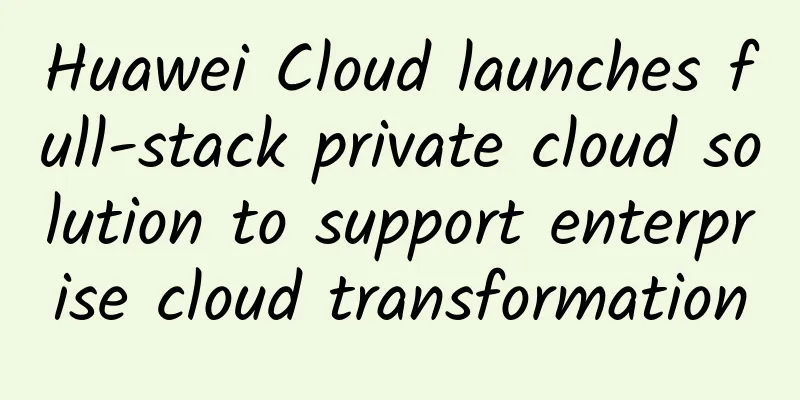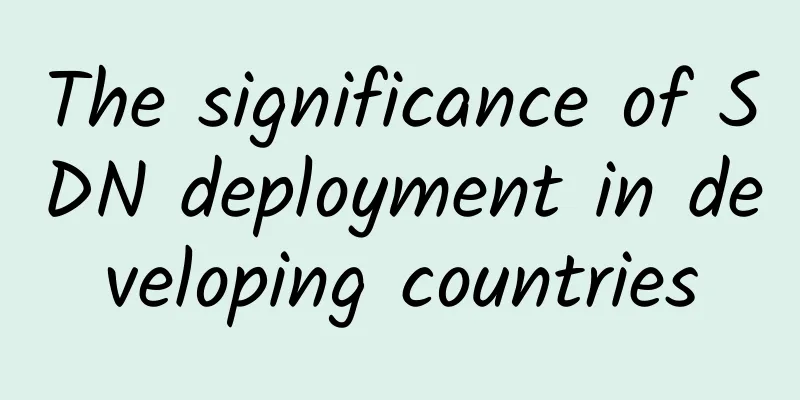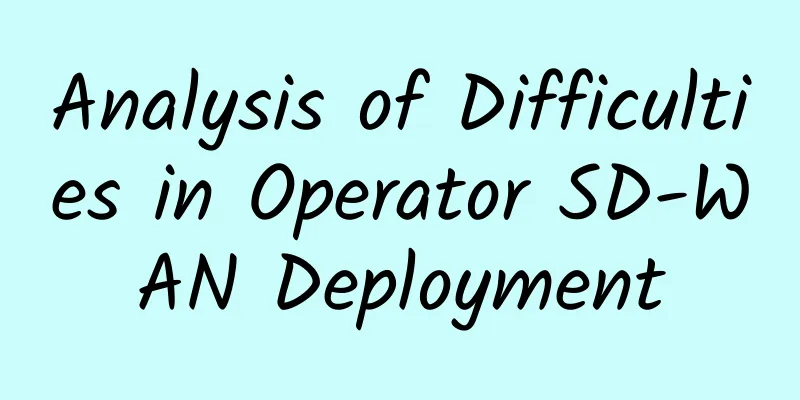Huawei Cloud launches full-stack private cloud solution to support enterprise cloud transformation

|
[51CTO.com original article] Recently, the Huawei Cloud Full-Stack Private Cloud Solution Conference with the theme of "Full-Stack Cloud, Smart Future" was successfully held in Beijing. At the conference, Huawei officially released the industry-leading full-stack private cloud solution FusionCloud 6.3, and explained in detail the current situation and market demand of the Chinese cloud market.
Enterprise rigid demand is transforming into growth potential for private cloud He Baohong, Director of the Cloud Computing and Big Data Institute of the China Academy of Information and Communications Technology, was invited to give a wonderful speech. He pointed out that the public cloud market grew steadily in 2018, and the winner-takes-all phenomenon was very obvious. It will maintain a growth rate of 30% in the next few years. In contrast, the growth curve of the private cloud market has slowed down, but the volume is larger than that of the public cloud. He Baohong introduced that among the industry user groups, early users bought specific products and specific solutions. However, with the increase in customer volume and the increase in solution complexity, more and more people are choosing end-to-end solutions, that is, full-stack solutions, compared with traditional enterprises. In He Baohong's view, this is also the reason why Huawei Cloud provides full-stack cloud solutions. "Public clouds cannot take everything, and enterprises' demand for intelligent operation and maintenance, data security, and risk internal control is becoming more and more intense, so the development momentum of private clouds remains unabated. It is obvious that multi-cloud will definitely become the mainstream trend in the future." He Baohong believes that in the future, complexity will be migrated from the user layer to the cloud across the network, and cloud service providers will lead the development in the next decade or even longer. Huawei Cloud's achievements in this regard are worthy of recognition. Huawei Cloud provides a comprehensive service capability from the user's perspective Ma Li, President of Huawei IT Cloud Computing and Big Data Platform Product Line, agrees with He Baohong. He also believes that the combination of traditional industries and emerging technologies can truly accelerate the process of digital transformation and upgrading of users. Ma Li said that Huawei's private cloud solution was born to carry out this mission, and its biggest feature is full-stack intelligence. "In the intelligent society, intelligent computing is achieved through distributed software to solve the next step of digital transformation of the entire industry. This is exactly the goal of Huawei Cloud." The full-stack cloud FusionCloud 6.3 version officially released at the venue is the industry's only full-stack private cloud solution, which builds cloud transformation capabilities from chips to hardware, online to offline, IaaS, PaaS to DaaS. Ma Li told reporters that in contact with customers in the financial, manufacturing and other industries, Huawei found that the foundation of the cloud platform determines the foundation of enterprise digitalization and is the key factor in the success or failure of enterprise digital transformation. To meet the needs of customers' digital transformation business, such as investment reuse, automated service resources, centralized sharing of data assets, and rapid development of distributed architecture, it is necessary to first improve the technical capabilities of the cloud platform to support customers' digital transformation. In practice, Huawei believes that a full-stack cloud must include four elements to meet enterprise needs: first, the continuity and comprehensiveness of business carrying; second, the ability to provide different business loads around different businesses to meet customers' cloud services; third, providing the required resources for various business scenarios, and unifying all layers from chips, hardware, and software; fourth, future-oriented multi-cloud management, meeting the management needs from edge to distributed cloud, and to multi-cloud unification. In previous interviews, Huawei has always emphasized "one cloud, one lake, one platform". So how is it different from the current full-stack private cloud FusionCloud 6.3 version? Ma Li said that from the perspective of operation experience, operation and maintenance experience, and tenant experience, it is difficult to form an effective overall solution for "one cloud, one lake, one platform", and the actual level of each manufacturer is also different. The focus of the full-stack private cloud solution FusionCloud 6.3 is to solve the user experience problem, and it can truly provide customers with unified software functions. The operation and maintenance platform is also unified, and each layer of the software, whether it is the data layer or the PaaS layer, can continue to evolve and can be replicated in batches by partners to better focus on industry application scenarios. The Chinese cloud market has transitioned from small-scale trials to large-scale construction. Customers no longer need to hand over a product, but services. Cloud service providers need to help customers make good use of this cloud to realize the cloudification of business and the realization of valuable data. Huawei's full-stack cloud wants to provide such a capability, a service capability that is completely different from the past, covering all services from computing, storage, network to upper-layer big data services, security services and data applications. As of the end of last year, Huawei's private cloud has served 144 countries and more than 4,300 customers, with more than 3.8 million virtual machines on the current network. It is understood that Huawei's current development of cloud in China is remarkable in desktop cloud, virtualization is the best among domestic manufacturers, government cloud is the best, and big data is the best. Obviously, this is the market's response to Huawei Cloud's best. [51CTO original article, please indicate the original author and source as 51CTO.com when reprinting on partner sites] |
>>: Three Misconceptions about Edge Computing
Recommend
LOCVPS Hong Kong Cloud/Confederation bandwidth upgrade is free of charge, top up 350 yuan and get 50 yuan, 20% off for the whole site
LOCVPS is a long-established Chinese VPS service ...
Microsoft Accelerator Poetry Heart starts its journey to build an empathy platform with technological innovation
On March 15, 2018, the 11th Microsoft Accelerator...
Detailed explanation of TCP connection status and closing method and TCP parameter optimization under Winserver system
To be honest, the TCP connection method on Window...
Talk about TCP's three-way handshake and four-way wave
[[400134]] This article is reprinted from the WeC...
HostKvm April Promotion: 20% off on all VPS hosts, starting from $5.2/month in Hong Kong/Los Angeles data centers
HostKvm is a foreign hosting service provider fou...
CloudCone Easter Promotion: $15/year KVM-1GB/30GB/3TB/Los Angeles Data Center
CloudCone offers three special VPS packages for t...
Σco Time | Huawei Cloud Smart Healthcare Solution builds an intelligent epidemic prevention and control system
[51CTO.com original article] Although the COVID-1...
Traditional Networks vs. IoT Networks: What’s the Difference?
IoT provides businesses with greater visibility, ...
China Academy of Information and Communications Technology: China's 5G mobile phone shipments in March reached 27.498 million units, a year-on-year increase of 76.2%
On April 12, the China Academy of Information and...
TCP SYN Queue and Accept Queue
First we must understand that a TCP socket in the...
How much will the operator's 1G traffic fee be reduced to?
Can you bear not going online? Obviously not, bec...
China Broadband Truth Investigation (Part 2): Why Internet speed is always different from what is advertised?
No matter which operator you apply for broadband ...
How practical is 5G for ordinary people?
5G has three main advantages over 4G: high speed,...
Imitate Spring to implement a class management container
Overview The original intention of the project wa...
HostYun: 25 yuan/month KVM-1GB/10G SSD/500GB (including CN2)/Korea VPS
Let's take a look at HostYun's informatio...









